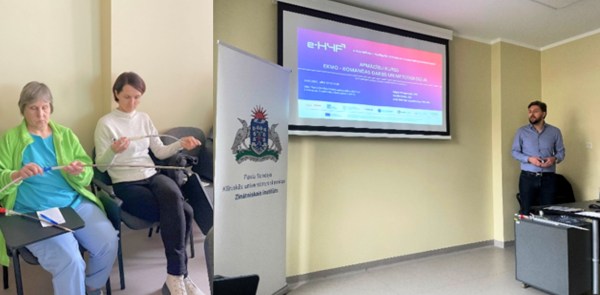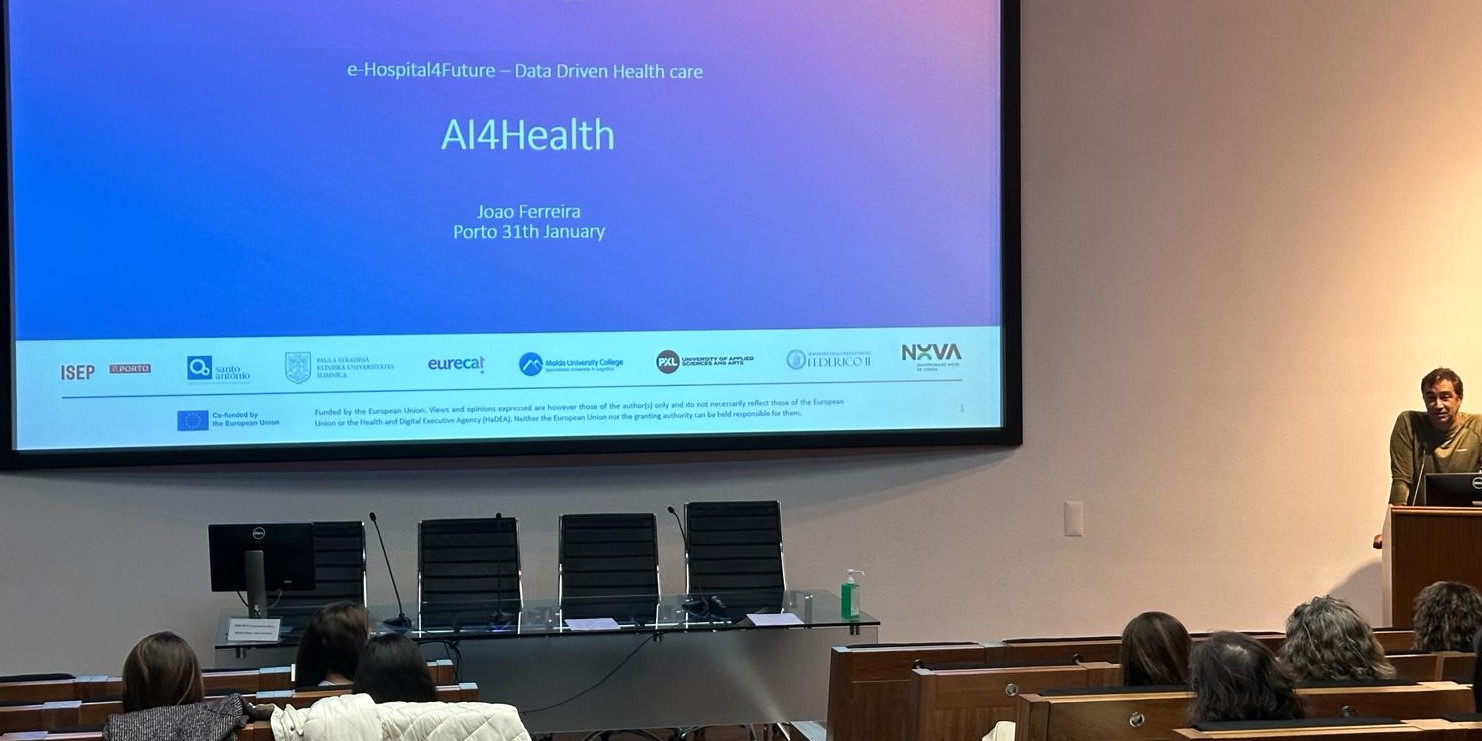Blog del sito
Pauls Stradins Hospital Launches New ECMO Training Course in Latvia
Riga, Latvia, March 19

In a significant step toward enhancing critical care, specialists at Pauls Stradins Clinical University Hospital hosted a pioneering training course titled "Extracorporeal Membrane Oxygenation: Evolution, Teamwork, and Methodology.”
This comprehensive program aims to equip Latvian medical specialists with the skills necessary to provide life-saving ECMO support.
“- Our goal is patient-centred care and safety. ECMO is a team effort,” says Dr Katrina Rutka at Pauls Stradins Clinical University Hospital.
ECMO Essentials: From Teamwork to Troubleshooting
When hearts falter and lungs fail, ECMO steps in. Extracorporeal Membrane Oxygenation (ECMO), a method of life support, has gained prominence during the COVID-19 pandemic.
The procedure involves circulating blood outside the body through a membrane oxygenator, providing oxygenation when cardiac or respiratory function is compromised.
The COVID-19 pandemic proved that ECMO procedures can succeed highly in selected patient groups.
Trainer team and Participants
The training author team consisted of Dr. Edgar Prozorovskis, Dr. Katrina Rutka, and Prof. Robertas Samalavicius.
The training course, conducted both online and on-site, caters to a multi-professional audience.
Participants include anesthesiologists, intensive care specialists, cardiac and vascular surgeons, cardiologists, perfusionists, intensive care nurses, lung disease specialists, physiotherapists, and rehabilitation experts.
Impact of the ECMO Training
The ECMO training course equips Latvian medical specialists with essential skills for providing life-saving support. Participants learn about team dynamics, equipment, patient selection, and managing complications. This collaborative effort promises improved patient care and safety.
Data driven health care - new course delivered in Porto, Portugal
Porto, Portugal, January 13, 2024

The e-Hospital4Future team in Porto, Portugal have launched a new course module focusing on using data to improve healthcare.
This project aims to use advanced data science techniques to analyze healthcare information, which could greatly benefit patient care.
“- This project is all about using data to improve healthcare. We’re looking at how we can use the latest data science methods to understand healthcare data better,” said Ivone Silva, Work package leader at Centro Hospitalar Universitario Do Porto EPE (CHUdSA).
The project covers several vital areas.
- Cleaning and Preparing Data: The team works on fixing issues like missing or incomplete data and prepares both structured and unstructured healthcare data for analysis.
- Visualizing Data: They create charts, graphs, and maps to help understand large and complex datasets, revealing important patterns and insights.
- Data Mining and Machine Learning: The team uses different learning techniques to find hidden relationships and patterns in healthcare data, focusing on classification and clustering.
- Predictive Modeling: The project builds models to predict future health outcomes based on past data, which could significantly improve patient care.
- Natural Language Processing (NLP): The team uses NLP to extract valuable information from unstructured data, like text from electronic health records, opening up new possibilities for personalized medicine.
- Ethics and Privacy: The team ensures they follow ethical guidelines and regulations, such as HIPAA and GDPR when handling healthcare data.
This project is a big step forward in using data science to improve healthcare, aiming to make patient care better and more efficient.
e-Hospital4Future - European consortium funded by EU4Health program

On October 17th, 2023, at the Altice Forum, in Braga (Portugal), an event on the European Commission's Direct Management Programmes took place: "What funding in the 2022-2027 cycle?", so the various sources of funding available for the coming years were presented. In this sense, in session I: Competitiveness, Technology and Innovation, the EU4Health Programme was presented by Dr. Inês Tavares Ferreira from SGMS, where the balance of Action Grants that obtained funding in 2021/2022 and that have the involvement of Portuguese partners was also presented. Of the 22 approved proposals, the Portuguese partners obtained about 5M€ in funding, where the e-Hospital4future project leads with about 1M€ obtained, about 20% of the funding obtained for Portugal! In addition, the project led by ISEP is one of the 3 projects that has Portuguese leadership, which demonstrates the ability to manage and administer consortia of a highly demanding program, such as EU4Health. Finally, it is also important to highlight that the e-Hospital4Future project was also the project chosen by SGMS to be presented during the event.
e-Hospital4Future kick-off meeting at ISEP
The #e-Hospital4Future# - Building future through an innovated and digital skilled hospital project, which intends to elevate the education process of health professionals (clinical and non-clinical), combining modules of social skills (soft skills), technical skills (hard skills) and digital skills.
The project is led by Professor Ana Madureira and will be carried out by a multidisciplinary consortium of 8 institutions from 6 European countries: ISEP (Coordination, Portugal), UNL (Portugal), PXL (Belgium), EURECAT (Spain), UNINA (Italy), HiMolde (Norway), CHUSA (Portugal) and PSKUS (Latvia).
The #e-Hospital4Future Kick-off meeting took place on March 28th at ISEP, with the participation of all partners.
For more information please follow 👉 https://isep.ipp.pt/New/ViewNew/6838
#HealthUnion #EU4Health #ISEP #Porto #DigitalSkills
ISEP leads european consortium e-Hospital4Future

The project e-Hospital4Future - Building future through an innovated and digital skilled hospital, which aims at the creation, dissemination and implementation of training modules for clinical and non-clinical health professionals in hospital environment, is being led by Professor Ana Madureira from the Instituto Superior de Engenharia do Porto (ISEP).
The proposal will run for 24 months and has a total investment of 2 950 491,60 € (80% funded), supported by the European Union under the EU4Health programme.
The work will be carried out by a multidisciplinary consortium of 10 institutions from eight european countries:
- 6 Universities and technology centres - ISEP (Coordination, Portugal), Universidade Nova de Lisboa (Portugal), Hogeschool PXL (Belgium), Fundacio EURECAT (Spain), University of Naples Federico II (Italy) and Molde University College (Norway) - in charge of the methodologies and development of the training programmes.
- 1 Public health institution - Institute for Public Health of Federation of Bosnia and Herzegovina - contribution to the definition of teaching needs, programme contents and implementation.
- 3 Hospitals - Centro Hospitalar Universitário de Santo António, E.P.E. (Portugal), Paula Stradina Kliniska Universitates Slimnica (Latvia) and Viesoji Istaiga Vilniaus Universiteto Ligonine Santaros Klinikos (Lithuania) - mainly responsible for implementing the courses.
E-Hospital4Future intends to elevate the education process of health professionals, combining modules of social skills (soft skills), technical skills (hard skills) and digital skills.
The ambition of the project is to go beyond the status quo in the capabilities of health professionals, innovating the contents and methodologies of training programmes for the target audience. The final goal of e-Hospital4Future is to boost the implementation of this kind of training programmes all over Europe, including not only hospitals and other healthcare institutions, but also schools and universities. The work has already started in March and the official kick-off meeting of the project took place on March 28th at ISEP, with the participation of elements from all partners.
